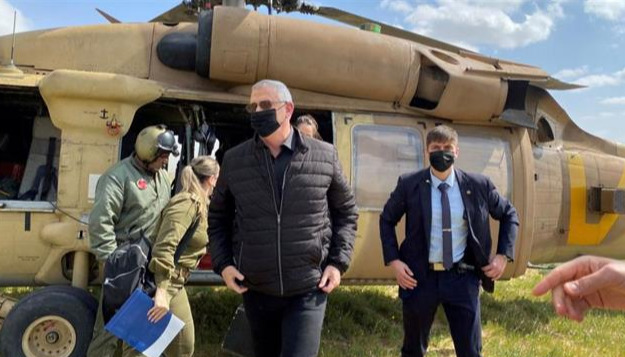
Israel's minister of military affairs Benny Gantz (center) adjusts his jacket after stepping off a helicopter at the Gaza Strip's border on March 2, 2021. (Photo: Reuters)
Tel Aviv, March 3 (RHC)-- Israel is working to "influence" the International Criminal Court (ICC) in order to protect its forces against possible rulings on war crimes, says the regime’s minister of military affairs.
In a major decision last month, a pre-trial chamber of the ICC determined that The Hague-based tribunal had jurisdiction to investigate the atrocities committed by the Israeli military in the occupied West Bank, the besieged Gaza Strip and East Jerusalem al-Quds since 1967.
In an interview with Reuters on Tuesday, Benny Gantz labeled the ruling as a "negative development," and said, "We have our own teams working in different places to try and influence the ICC." Gantz was the Israeli military's chief of staff during a 2014 war between the regime and the Palestinian resistance movement of Hamas in Gaza. The ICC has pointed to that conflict as a potential issue to be probed.
Asked by Reuters how many Israelis, including himself, might expect to be subject to arrest should the probe lead to criminal investigations, Gantz responded: "I guess several hundred, but we will take care of everybody."
Israel’s minister of military affairs added that Tel Aviv would provide legal assistance to any implicated Israelis and would give them legal warnings regarding travel if necessary. The ICC verdict was condemned by Israel but praised by Palestinians and international rights organizations, paving the way for the court to open a war crimes investigation in the occupied territories despite objections from the Tel Aviv regime.
Michael Lynk, the UN special rapporteur on the situation of human rights in the Palestinian territories, hailed the decision and said the ruling “opens the door” for justice in Palestine.
Israel occupied East Jerusalem al-Quds, the West Bank, and the Gaza Strip — territories the Palestinians want for their future state — during the six-day Arab-Israeli war in 1967. It later had to withdraw from Gaza.
About 700,000 Israelis live in over 230 illegal settlements built in the West Bank and East Jerusalem al-Quds since then. The international community views the settlements as illegal under international law but has done little to pressure the Israeli regime to freeze or reverse its policies.

